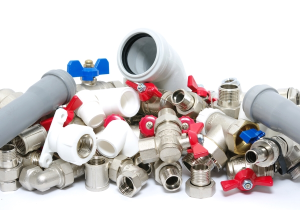
Mr. Rooter Plumbing explains common plumbing pipe types and their uses.
|
There are many different types of plumbing pipes materials, but the most common typically come in either metal or plastic. Both have their pros and cons, and having the basic knowledge of these popular types of pipes will help you make the right choice when choosing a plumbing system for your residential home.
Types of Plumbing Pipe Materials
Metal Pipes
Historically, most plumbing pipes have been made out of metal. This is because metal pipes typically are very durable and have incredible longevity. Common types of metal pipes are copper and galvanized steel pipes.
Copper
Typically used to supply water to appliances, copper pipes are a reliable and long-standing plumbing material. Resistant to corrosion and utilized for both hot and cold temperatures, copper is an excellent choice for many homes' plumbing. Unfortunately, copper can be costly and individual parts must be soldered together. The soldering requires an experienced plumber and additional fittings.
Galvanized Steel Pipes
Very long-lasting and incredibly durable, galvanized steel pipes are commonly used for outdoor or underground water supplies. Composed of steel or iron, these pipes can also be coated with other metals to improve rust resistance. They are also a cheaper alternative to copper, but they have some downsides. Galvanized steel has been known to rust over time and can restrict water flow and cause many other plumbing issues. For these issues, galvanized steel pipes are no longer accepted by building codes in some applications.
Plastic Pipes
If you’re looking for a metal alternative, plastic pipes are a quieter and more affordable option than metal. They can stand up to high water pressure and are resistant to corrosion and impact damage.
Chlorinated Polyvinyl Chloride Pipes (CPVC Pipes)
A very common type of pipe for residential use, CPVC pipes can be used for high-pressure water conditions and home appliances like sinks and toilets. Low-cost, lightweight, immune to rust and corrosion, and available in various sizes and fittings, CPVC pipes can accommodate almost any water need. However, CPVC pipes have been known to break down if exposed to the sun and conversely, they can split if the water inside them freezes.
Polyvinyl Chloride Pipes (PVC Pipes) and Acrylonitrile Butadiene Styrene (ABS)
PVC & ABS pipes are another common type of pipe used for residential systems. They are primarily used as drainage for all plumbing fixtures and appliances that use water. They are used inside the walls, under the foundation, and on the exterior of the house as part of the underground sewer line.
Cross-Linked Polyethylene or PEX Pipes
Newer to the market and used in both commercial and residential properties, PEX pipes are flexible tubes that can be woven through walls and floors. Their small form and flexible body allow them to expand and contract with temperature changes, making PEX pipes exceptionally resistant to leaks, ruptures, and corrosion-free. However, like the other plastic pipes on the market, they too are vulnerable to the sun's rays and can degrade over time.
Related Topic: Water Pipe Replacement: Should You Choose CPVC or PEX?
The Most Common Plumbing Pipe Sizes
There are nuances to each pipe size that are important to the job it needs to accomplish. The most common plumbing pipe sizes you will see for residential projects include:
- Pipe size for drains: Most modern drains have a 1-½ inch outlet. Larger drain lines will 3 or 4 inch size pipe for water supply lines: The pipeline from the street to your home is either ¾ inch or 1 inch in diameter.
- Pipe size for vent stacks: Vent pipes are never less than 1-¼ inches in diameter.
As illustrated above, each job requires a different size pipe. For example, you wouldn't run a 1-½ inch copper pipe in both a sink and a water supply line. Using the wrong size pipe can cause multiple problems in your plumbing system, from clogged drains to even a burst pipe from incorrect water pressure.
Find Expert Plumbing Pipe Service
Pipes come in various shapes, sizes, and materials. How do you know which type of pipe to pick and why? Luckily, your local Mr. Rooter® Plumbing has expert-level knowledge and experience when it comes to selecting and installing all types of pipes. Our licensed plumbers perform pipe installation, repair, replacement, and even sewer video inspection services. If you’re looking for a licensed plumber to repair or replace the pipes in your home, call Mr. Rooter Plumbing or request a job estimate online today.

